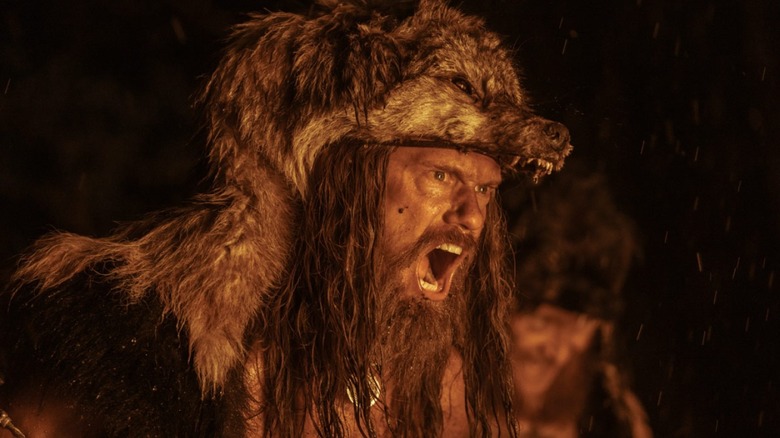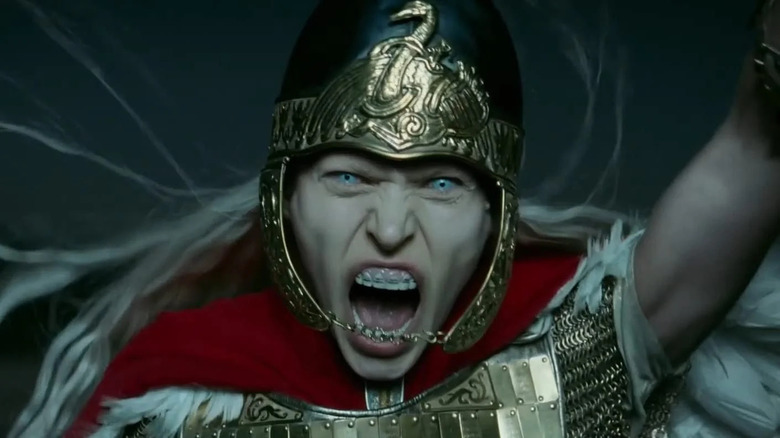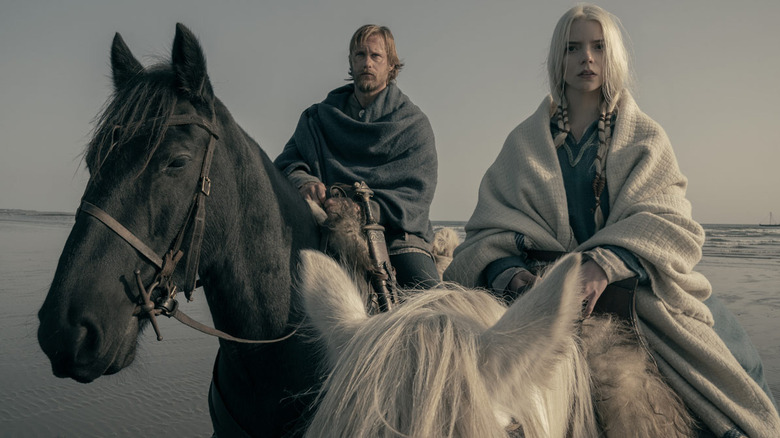The Northman Ending Explained: Revenge Is A Flat Circle
We're in a bit of a Vikings renaissance — a Vikingssance, if you will. Whether it's "The Last Kingdom" and its tale of identity and war, the intricate political scheming of "Vikings Valhalla," the animated coming-of-age epic "Vinland Saga," or even the sci-fi take from Marvel's "Thor" movies, it's a good time to be into Vikings. These titles have helped challenge the notion of Norse people as just uncultured savages, showing instead complex tales of political intrigue, with intricate social and religious systems, and stories that are about more than pillage and plunder.
The latest project to try and join that group is Robert Eggers' "The Northman," a movie that retells the legend of Amleth — which inspired Shakespeare's "Hamlet" — and plays like a live-action "Vinland Saga" by way of Genndy Tartakovsky's "Primal." This is a film that teases the complexity and higher drama of something like "History's Vikings," but stays focused on a smaller, intimate tale of revenge, while not being afraid to get dirty and brutal in its depiction of Viking culture, especially how slavery played into it.
Understanding the ending of the film involves navigating a lot of bizarre, enthralling dream imagery and Norse mythology, as well as some real history. Let's take a look at the tale of Amleth.
A brutal life of violence
"The Northman" follows the tale of Amleth (Alexander Skarsgård), son of King Aurvandill (Ethan Hawke), who is betrayed by his brother, Fjölnir (Claes Bang). Amleth escapes his country and vows to avenge his father, save his mother, and kill Fjölnir. Years later, Amleth has joined a Viking horde plundering and pillaging Eastern Europe, and hears a prophecy that reignites his desire for revenge. Joined by an enslaved sorceress named Olga (Anya Taylor-Joy), Amleth travels to Iceland while posing as a slave and begins a reign of terror on Fjölnir.
From the get-go, what makes "The Northman" stand out from other Viking-centric tales is its focus on the banality and matter-of-fact way violence and savagery were part of the day-to-day Viking culture. When we see Amleth fight, he is absolutely brutal, a one-man army capable of mowing down every armored soldier he faces while being mostly naked. Indeed, Amleth is a berserker, a part of the vanguard for a Viking army sent in first to attack with fierce and bloody violence to shock the enemy before the main troops arrive — while high on drugs that send Amleth on a trance-like state of rage.
It's not just that we see several characters talk about wanting to die by the sword in order to reach Valhalla or that dying of old age is disgraceful, but Eggers shoots the misery and brutality of war in a way that's simultaneously over-the-top but also chillingly nonchalant. When we see Viking warriors gather up the survivors they didn't deem fit enough to be slaves and trap them in a house they then set on fire, it's shocking and upsetting, but played out like just another day at the office.
Vengeance, like war, never changes
Before embarking on his quest for vengeance, Amleth receives a warning that he will one day have to choose between "kindness for your kin or hate for your enemies," a warning that marks the central theme of "The Northman."
Indeed, while on a surface level the movie has a basic and familiar premise (to be fair, it is really a tale as old as time), it is still a profound tale of the cyclic nature of vengeance. After having spent most of the film slowly enacting a plan to terrorize Fjölnir and his henchmen, Amleth is finally reunited with his mother Gudrún (Nicole Kidman), which changes everything.
The big (and only, really) twist in "The Northman" is that Gudrún is not a defenseless victim, but the person that put this entire story in motion. It was her idea to get Fjölnir to kill Aurvandill, as she reveals that she was a slave to Aurvandill herself, and Amleth's birth was the result of rape. After biding her time for years, she and Fjölnir saw a way to break free from her former husband's cruelty. Choosing to spare Amleth from a life of hate and revenge, and to protect her new son with Fjölnir, Gunnar, she suggested Fjölnir's men kill Amleth as a child too.
This revelation — and the deaths of Gudrún and Gunnar at Amleth's hand soon after — are impactful because it plays into the film's portrayal of the horrors of Viking times (the violence and the slavery), but also how hard it is to escape a cycle of hatred and revenge. Amleth is as much a victim as Gudrún, and his quest for vengeance is but the latest chapter in a story she began long ago. When Amleth hears Gunnar's screams of terror after seeing his mother being murdered, he sees himself become like Fjölnir, creating a new Amleth in the young boy.
The ultimate message of the film, that once you enter a path of violence it is nearly impossible to escape, comes at a climax when Amleth discovers that Olga is pregnant with his twins, and leaves her on a ship to the mainland while he goes looking for Fjölnir. He has chosen hate for his enemies, leaving behind any semblance of humanity or love. When Amleth fights Fjölnir at the base of a volcano, which they call the Gates of Hel, he is completely naked, a berserker once again, high on a thirst for blood and revenge that ends both his and Fjölnir's lives.
"The Northman" is metal as hell, a movie with bizarre imagery, spectacular acting, and a simple yet powerful story of the flat circle of revenge and how often it leads to naked fights in volcanos.
"The Northman" is now in theaters.


